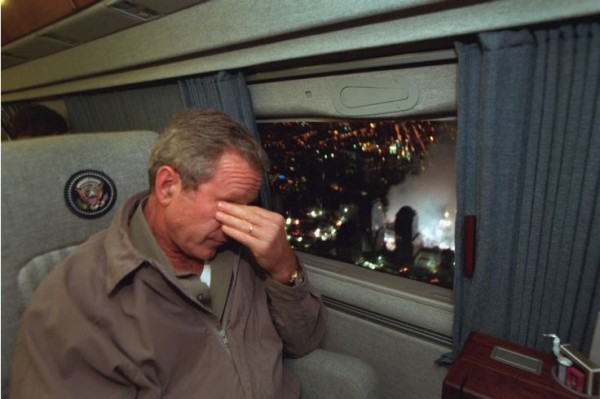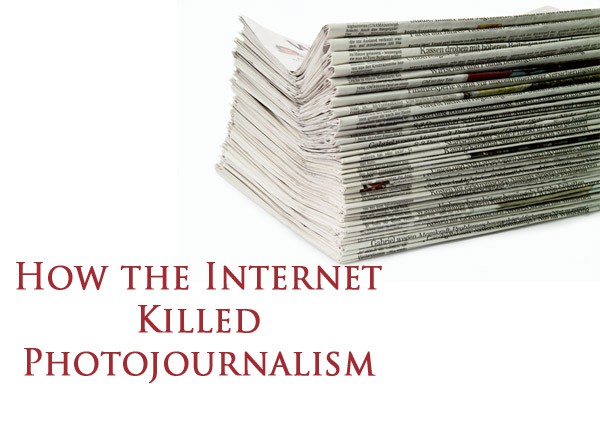Photography essentially is a feel-good exercise for ourselves: We look at photographs to feel good. We want to feel good.
It is important to realize that this is usually true even when photographs make us feel bad: it is precisely the fact that we know we should feel bad that can result in our enjoyment.
Category: Photojournalism
-
Review (of sorts): Interrogations by Donald Weber (in actuality an investigation of the shoot-the-messenger syndrome)
-
A square vision
We really need to stop with this “Portrait photojournalism”. Making protagonists of a major event, whether it is a war, devastation, famine, drought, Tsunami, Hurricane and so on pose statically in front of a camera is not only boring as hell but completely useless for those of us who really want to know and experience what is going on
-
Patrick Chauvel : a living legend
“‘You look like you’re dead.’ Those are the opening words of Les pompes de Ricardo Jésus. Pierre Schoendeoerffer utters them upon seeing a photo of Patrick wounded in Cambodia in April 1974. Patrick wrote these lines as he took his first steps on crutches after taking ‘a bullet in the left ankle, a present of the Revolutionary Guards in Tabriz’ in 1980… “
-
Emerging Talent – Ian Bates
Its really tough figuring out whether or not I want try to get a job at a newspaper (if there are any jobs available) or if I want to put my energy into building a freelance business. Right now I am aiming towards trying my luck at being a freelance photographer but I’m not sure exactly where I want to be located just yet. Being a freelance photographer will allow me to work on personal projects as well as work for a bunch of different clients, but it really all depends on the industry and what I can work out.
-
The Run-on of Time
After more than forty years as a photographer, I’ve been repeatedly told it’s time to consider putting together a retrospective. But I remain hesitant. It’s not the pictures, though there are a lot of ordinary ones. When you look back, you realize how many people you’ve lost touch with, how many people have either passed on or are unreachable.
-
Disaster Photography: When is Documentary Exploitation?
Disaster Photography: When Is Documentary Exploitation?
Photographers who produce spectacular images of Detroit, Chernobyl, and other ravaged areas have sparked disagreements whether they are exploiting others’ misfortune—or just covering the bad news…
via ARTnews.com: https://www.artnews.com/art-news/news/the-debate-over-ruin-porn-2170/
Photographers who produce spectacular images of Detroit, Chernobyl, and other ravaged areas have sparked disagreements whether they are exploiting others’ misfortune—or just covering the bad news
-
Notes from the Field: Camille Lepage in South Sudan
I met Camille Lepage in South Sudan last September when I arrived in the capital Juba on a two-week assignment. She had already been living there for almost two months, and has been there ever since. She was a huge help in getting our story off of the ground and filling my colleague and I in on how South Sudan works, with all the necessary tips and tricks that help make things happen there. And there are a lot of tips and tricks needed.
-
Let’s Be Professional About This
There’s a big difference between a professional plying their trade and an amateur. In this image I see evidence of two people (in particular) reacting to an unexpected attack, an atrocity, in a professional manner.
The first is the officer on the left, who unlike your average celluloid action star, has her finger in the proper position and not on the trigger of her weapon. The second, is photographer John Tlumacki of the Boston Globe who captured THE moment in a straight forward manner without any photo-gizmo trickery.
-

Lipstick on an Administration: Reading Eric Draper’s “Front Row Seat” Photos of George W. Bush
Lipstick on an Administration: Reading Eric Draper’s “Front Row Seat” Photos of George W. Bush – Reading The Pictures
What’s more interesting about the retrospective photos of Bush by Eric Draper is how defensive they are.
via Reading The Pictures: https://www.readingthepictures.org/2013/04/lipstick-on-an-administration-reading-eric-drapers-front-row-seat-photos-of-george-w-bush/
What’s more interesting about the edit than anything is how defensive it is. In other words, it feels like it’s specifically designed to counter and re-frame Bush’s considerable faults and mistakes. Take the absolutely stunning photo of Bush flying over the smoldering World Trade Center site, for example
-
Students, Spot News and the Boston Bombing
“As a human being, you’re going to react to things,” Lippincott said. “In an occasion like this where most people run away from something, and you instinctively run toward something, you’re going to subject yourself to a lot of potential second guessing. Once it’s over and you decompress, you’re going to get depressed. You’re going to be affected by it, you’re going to feel it personally, you’re going to feel sad for a while and it’s OK to feel that way. It’s part of what happens in a situation like this.”
-
Boston Marathon Bombing
At heart, I am a photojournalist, having worked for newspapers and wire services for the better part of the last 10 years. We often ask ourselves how we would react in a tough situation, because invariably, we end up covering fires, shootings and other tragedies. This was different, though, and I had no idea what I would see from the top of the bridge.
-
Gamma-Sygma: Hubert Henrotte répond
On May 13 you published an investigation by Michel Puech into the history of Gamma/Sygma. According to my European rights of reply, I ask that you publish this letter within 48 hours.
Grave mistakes were made by the people interviewed, and by Michel Puech. I cannot allow them to stand because some of them have caused me great offense. -
Tomorrow’s Sun-Times cover?
Jim Romenesko
via Jim Romenesko: http://jimromenesko.com/2013/05/30/tomorrows-sun-times-cover/
“It’s shocking that the remnants of the group that once had photographers like Scott Strazzante and Todd Heisler and Jon Lowenstein and Rob Finch, just to name a few of the Pulitzer-winners and Photographers of the Year that once worked at Copley Chicago, believes it no longer needs any staff photographers,” Sid Hastings, a former Copley Chicago photo editor said tonight from St. Louis. “It’s just shocking.”
-

How the Internet Killed Photojournalism
How the Internet Killed Photojournalism – PhotoShelter Blog
“The Sun-Times business is changing rapidly and our audiences are consistently seeking more video content with their news. We have made great progress in meeting this demand and are focused on bolstering our reporting capabilities with video and other multimedia elements. The Chicago Sun-Times continues to evolve with our digitally savvy customers, and as a…
via PhotoShelter Blog: https://blog.photoshelter.com/2013/05/how-the-internet-killed-photojournalism/
It’s not that the images don’t matter, it’s just that they matter for shorter durations of time.
